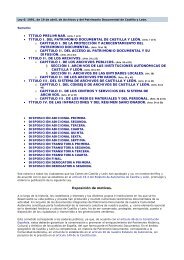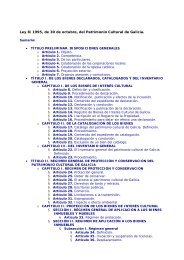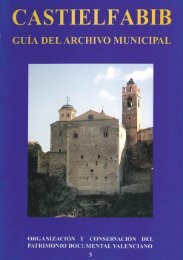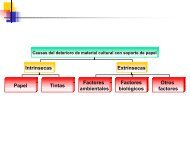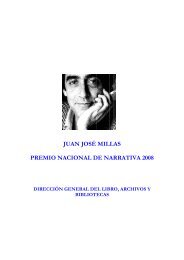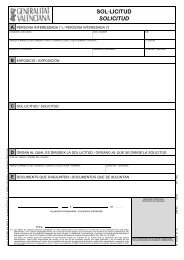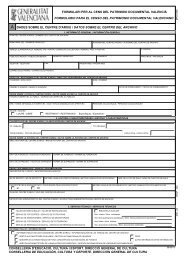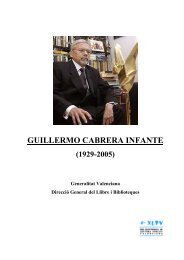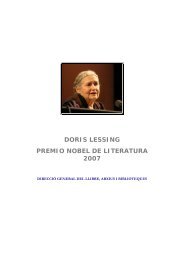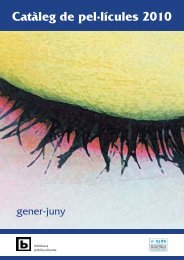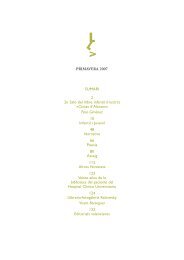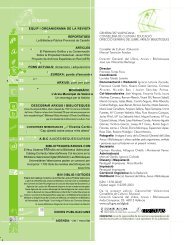Listening to the Past, Speaking to the Future
Listening to the Past, Speaking to the Future
Listening to the Past, Speaking to the Future
- No tags were found...
You also want an ePaper? Increase the reach of your titles
YUMPU automatically turns print PDFs into web optimized ePapers that Google loves.
54Volunteers known as Will Flatteners use <strong>the</strong>ir time and skills <strong>to</strong> makearchived wills more accessible <strong>to</strong> <strong>the</strong> public through practical s<strong>to</strong>rage.Pho<strong>to</strong>: Lancashire County Council Corporate CommunicationsWithin England, MLA has led <strong>the</strong> creation of a workforcedevelopment strategy for <strong>the</strong> museums, libraries andarchives sec<strong>to</strong>r and this will provide a mechanism forincreased partnership working. The creation of one ormore Sec<strong>to</strong>r Skills Councils that will include <strong>the</strong> needs of<strong>the</strong> archives workforce should also provide additionalapproaches <strong>to</strong> training and development. Recent researchhas indicated that <strong>the</strong>re is a market for a course inScotland from both potential students and employers.As a result, a new archive course will be launched laterthis year in Scotland. There is currently no archive coursein Nor<strong>the</strong>rn Ireland.enormous, cutting production times for <strong>the</strong>se documents,finding strays, creating more comprehensive and accurateindexes and preparing <strong>the</strong> records for microfilming.A huge thank you is due <strong>to</strong> our volunteers.”Developing <strong>the</strong> WorkforceThe UK is fortunate <strong>to</strong> have an advanced professionalarchives domain which is respected and admiredworldwide. However it is clear from <strong>the</strong> evidence collectedduring our consultation that <strong>the</strong>re are many concernsabout recruitment and retention of staff and developing anappropriate workforce in <strong>the</strong> future. These concerns arereflected in <strong>the</strong> research about workforce in <strong>the</strong> heritagesec<strong>to</strong>r and <strong>the</strong> archives domain, notably <strong>the</strong> Joint NationalCouncil on Archives/MLA Archives Workforce Study 7 .There can be very little doubt that <strong>the</strong> creation of a welleducated, diverse, strongly motivated and appropriatelytrained workforce at all levels is essential <strong>to</strong> <strong>the</strong>implementation and achievement of <strong>the</strong> recommendationsin this report.The need for a training infrastructure for <strong>the</strong> archives andrecords management workforce is UK-wide althoughcurrent courses exist only in England and Wales. Thedemographics of <strong>the</strong> future workforce indicate that newpeople, new patterns of working and new ways of trainingand development will be required.Supporting Staff in <strong>the</strong> WorkplaceWorking <strong>to</strong>ge<strong>the</strong>r with library colleagues, LincolnshireHeritage Services has implemented a staff trainingprogramme that enables staff <strong>to</strong> develop in <strong>the</strong>ir currentpositions and <strong>to</strong> move on <strong>to</strong> higher posts within andoutside <strong>the</strong> county council. The scheme has been effectivein helping junior staff <strong>to</strong> gain higher-grade posts in <strong>the</strong>archive and museum sec<strong>to</strong>rs.The programme includes heritage NVQs and managementtraining at various levels. Formal training is provided in <strong>the</strong>context of a development plan for each individual.Lincolnshire’s NVQ centre (co-ordinated from <strong>the</strong> countyarchives) is now supported by <strong>the</strong> East Midlands Hub, anda centre administra<strong>to</strong>r will be appointed <strong>to</strong> enable it <strong>to</strong>move forward at a regional level.Says Stephanie Gilluly, Area Service Manager, Archivesand Conservation, “Whilst valuing <strong>the</strong> training offered onuniversity courses, we recognise that not everyone hasaccess <strong>to</strong> university or college-based professionalqualifications. By focusing on staff development and bybasing training in <strong>the</strong> workplace, we get <strong>the</strong> benefit ofpeople’s increasing skills, and <strong>the</strong>y have <strong>the</strong> chance of realcareer progression.” The scheme has <strong>the</strong> potential <strong>to</strong>provide training across <strong>the</strong> domains, enriching <strong>the</strong>workplace experience of staff and enabling more people<strong>to</strong> pursue museum, archive and library careers.



